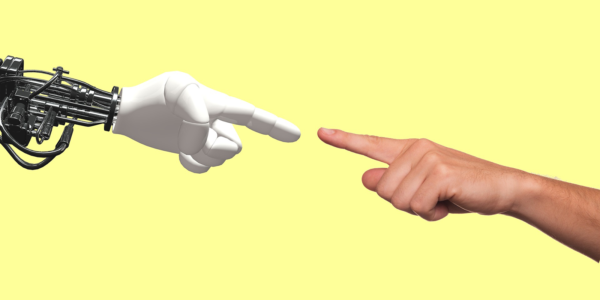5 Ways AI Can Improve Your Meetings

Human communication may not be the first thing you’d associate with artificial intelligence, especially if you’re used to less-than-fluid automated calls or chatbots. But, when harnessed effectively, the technology offers a great deal of potential for facilitating better, and even more creative, collaboration.
As AI becomes more ingrained in workplace collaboration technology, we’ll be able to channel some of the energy we used to devote toward mundane note-taking, scheduling and other tasks into juicing up our creative output. Here are five ways AI could potentially make more creative meetings possible.
1. Automated note taking allows brainstorms to go full-speed ahead
Have you ever been the person responsible for taking notes during a meeting, and during the meeting you constantly find yourself chasing whatever the last participant just said? At the end of a meeting like this, it’s probable you could barely remember the content of the meeting, let alone the details.
Automated note-taking and accurate meeting transcripts are one of the simplest ways AI can help free up meeting attendees to actually focus on the discussion taking place. Furthermore, transcripts can be searched for important keywords and ideas, allowing participants to fully absorb each detail and idea after the meeting has concluded. Giving everyone at the meeting the ability to participate without the burden of constant note-taking fosters a lively and uninhibited discussion, encouraging a seamless flow of ideas.
2. AI-powered action items and agenda updates keep you from getting bogged down with remembering specific details after the meeting has ended
AI technology is founded in rules-based responses to decisions, meaning it can be taught to recognize particular keywords. Organizers can plug in important words and AI can recognize those words and react – meaning AI is equipped to take action items, a more complex task than just providing a transcript of what occurred during a meeting.
On top of action items, AI can help to record deadlines, and, if programmed to do so, would be able to send out reminders as deadlines approach. AI can record the most important part of a meeting and share them with attendees after the fact, ensuring that none of the actions, intentions or necessary follow-ups are forgotten.
3. Automated capture of nonverbal cues can let you know when you’re onto a good idea
One of the things we talk about in the communications and collaboration division of LogMeIn is “meeting gold.” These are the moments during a meeting where ideas are born and everyone reacts in a positive way, but these moments can be difficult to identify.
AI will be able to more easily recognize and record those moments, because they are generally identified by nonverbal cues such as facial expressions, nods, laughter, peaks in the audio when everyone has that “ah-ha!” moment and other reactions that human note takers likely would not be able to accurately capture. This helps the meeting gold stay intact and be easily identified later, preventing great ideas from being misinterpreted or lost.
4. Improved overall efficiency prevents meetings from dragging on and draining people of their creative energy
Everyone has experienced a meeting that seems to drag on endlessly, or watched coworkers talk in circles. This can happen when people are not paying attention because they’re scribbling on notepads and typing on laptops, bringing up topics that were already discussed. This is what turns meetings into chores instead of the energizing moments of team collaboration they are meant to be.
When AI removes the more mundane aspects of a meeting like scheduling or taking attendance, however, attendees can move through administrative tasks and housekeeping items rapidly, knowing the AI will have it all recorded for later reference, and move into free-flowing exchanges of ideas. And for those routine meetings that occur frequently and don’t always entail a major brainstorm, AI facilitates effective and concise meetings so everyone can get in to the meeting quickly, have a productive meeting and then get back to the more inspiring work.
5. More personal interactions become possible when AI takes care of the mundane meeting tasks and you can put all of your focus on collaboration
The more that meeting attendees are able to focus on the meeting content itself, the more they will be able to come up with better ideas and more creative solutions to problems, thus building team rapport. By reducing the responsibility that seems to come with a meeting, people can relax, build candor and create a team that functions better in and out of the meeting room.
Ultimately, AI will improve the way we work with each other. Eliminating the repetitive and easy tasks that come along with the administrative aspects of meetings allows humans to work without constraint. It is much better, in the long run, to allow AI-powered assistants to take care of necessary but low-value tasks such as note taking, action items, agendas and reminders. Without the burden of worrying about these tasks, employees can bring their A-game to every meeting, increasing the usefulness of meetings tenfold.
Eduardo Cocozza is the Vice President of LogMeIn.
Get our Enewsletter
Get the latest sales leadership insight, strategies, and best practices delivered weekly to your inbox.
Sign up NOW →